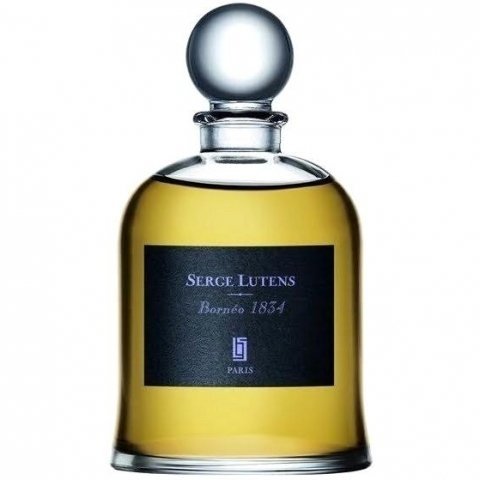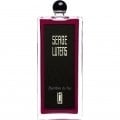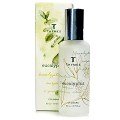Bornéo 1834 Serge Lutens 2005
4
Helpful Review
The almost lovable curmudgeon
Of all the essences that make up the vast vocabulary of perfumery few elicit as much mixed up, love-hate sentiment as patchouli. Examples of this can be found in reviews for patchouli-centric fragrances which read like regret filled soliloquies to failed relationships…
“I love patchouli, I really do, but…”
My love-hate relationship with the essence generally follows this pattern: I spritz on a patchouli rich fragrance and for the first hour or so it’s heaven. The seductive tendrils of scent are so exotic and alluring. But patchouli is also tenacious and it’s not long before the smell is omnipresent and clingy. Eventually this constant embrace leads to the feeling of an oily diffusion creeping over my skin making me itchy and claustrophobic.
I love patchouli, I really do, but…
…but I really do love patchouli and I wanted to find a scent that wasn’t a perfume boa constrictor. So I enlisted the braintrust of Parfumo’s “Fragrance Consulting Forum” for suggestions. I described my ideal patchouli perfume as having a dry, leafy setting of the essence. Serge Lutens Borneo 1834 was suggested by several members and it fits the description of my imagined fragrance perhaps just a little too well.
Borneo 1834 is -almost- a lovable curmudgeon of a scent. Like all lovable curmudgeons, it has a gruff, contrary exterior before revealing its warmer, slightly softer heart. But even when Borneo 1834 settles down it occasionally lets out a grumpy, contrarian harrumph.
This is not a fragrance for those seeking instant gratification. The first 20 minutes of development is downright rough and unsettled as cocoa, spices, patchouli and a dry, herbal accord vie for supremacy. When patchouli finally reaches its position of dominance, the cocoa and spices settle into an arid base reminiscent of other Christopher Sheldrake creations such as Santal Majuscule and Ambre Sultan. The difference is that Borneo 1834 also has the dry, herbal accord to create the illusion of withered patchouli leaves, which is the soul of the fragrance. Serge Lutens describes it this way: “Why did I pick 1834? That was the year Parisians discovered patchouli. In those days, it came wrapped in silk.” The island of Borneo was on the shipping route between the Asian silk producing nations and Europe and patchouli was folded into the fabric to repel insects.
Sheldrake is a genius at creating a sense of touch through perfume so the crinkly feeling of dried patchouli leaves is right at your fingertips. It's executed perfectly. But he could have made this a more approachable, friendly fragrance by incorporating the contrasting element of silkiness suggested by Lutens. Instead, the curmudgeony roughness of the opening stays with the fragrance and gives Borneo 1834 a vetiver like stoicism rather than the seductive, come hither quality usually associated with patchouli. Borneo 1834 is a wonderful creation, but it demands a particular sense of confidence and character from those who wear it. If you’re looking for a drier patchouli accord with a more inviting personality then something like Chanel Coromandel might be a better choice.
“I love patchouli, I really do, but…”
My love-hate relationship with the essence generally follows this pattern: I spritz on a patchouli rich fragrance and for the first hour or so it’s heaven. The seductive tendrils of scent are so exotic and alluring. But patchouli is also tenacious and it’s not long before the smell is omnipresent and clingy. Eventually this constant embrace leads to the feeling of an oily diffusion creeping over my skin making me itchy and claustrophobic.
I love patchouli, I really do, but…
…but I really do love patchouli and I wanted to find a scent that wasn’t a perfume boa constrictor. So I enlisted the braintrust of Parfumo’s “Fragrance Consulting Forum” for suggestions. I described my ideal patchouli perfume as having a dry, leafy setting of the essence. Serge Lutens Borneo 1834 was suggested by several members and it fits the description of my imagined fragrance perhaps just a little too well.
Borneo 1834 is -almost- a lovable curmudgeon of a scent. Like all lovable curmudgeons, it has a gruff, contrary exterior before revealing its warmer, slightly softer heart. But even when Borneo 1834 settles down it occasionally lets out a grumpy, contrarian harrumph.
This is not a fragrance for those seeking instant gratification. The first 20 minutes of development is downright rough and unsettled as cocoa, spices, patchouli and a dry, herbal accord vie for supremacy. When patchouli finally reaches its position of dominance, the cocoa and spices settle into an arid base reminiscent of other Christopher Sheldrake creations such as Santal Majuscule and Ambre Sultan. The difference is that Borneo 1834 also has the dry, herbal accord to create the illusion of withered patchouli leaves, which is the soul of the fragrance. Serge Lutens describes it this way: “Why did I pick 1834? That was the year Parisians discovered patchouli. In those days, it came wrapped in silk.” The island of Borneo was on the shipping route between the Asian silk producing nations and Europe and patchouli was folded into the fabric to repel insects.
Sheldrake is a genius at creating a sense of touch through perfume so the crinkly feeling of dried patchouli leaves is right at your fingertips. It's executed perfectly. But he could have made this a more approachable, friendly fragrance by incorporating the contrasting element of silkiness suggested by Lutens. Instead, the curmudgeony roughness of the opening stays with the fragrance and gives Borneo 1834 a vetiver like stoicism rather than the seductive, come hither quality usually associated with patchouli. Borneo 1834 is a wonderful creation, but it demands a particular sense of confidence and character from those who wear it. If you’re looking for a drier patchouli accord with a more inviting personality then something like Chanel Coromandel might be a better choice.



 Greysolon
Greysolon
